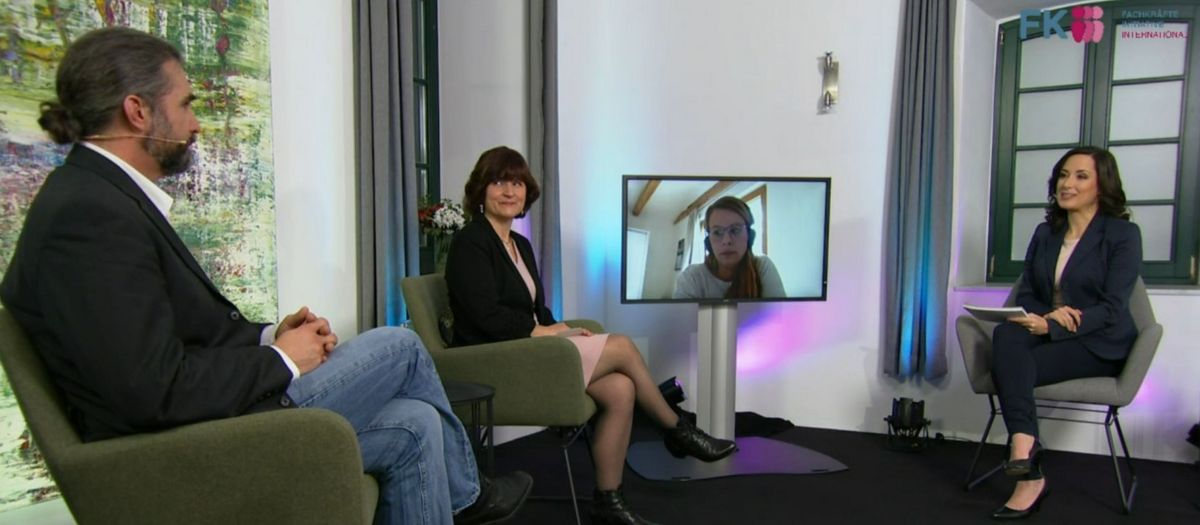On the agenda of today’s event: new approaches, innovative formats and 26 new projects, promised Daniel Poli, Head of Department at IJAB and facilitator Nadia Zaboura as the event commenced. It was broadcast live from a studio in the Cologne suburb of Frechen, with guests and guest speakers joining either on-site or online. The platform wonder.me was open to participants for socialising, and workshops on the specific themes of Fachkräfteinitiative.International were offered on Microsoft Teams.
Opening up to transnational influence
The hybrid setting chosen for the event exemplified one of the many possible responses to the continuing Coronavirus pandemic, which Professor Wolfgang Schröer referenced in his keynote address. Prof. Schröer, the chairman of the Federal Youth Advisory Board, is a recognised expert for child and youth services. He is also a lecturer and researcher at the University of Hildesheim, which provides research support to Fachkräfteinitiative.International. In his reassuring address, he emphasised that while the pandemic had meant severe restrictions for youth and expert mobility, it had also opened up new opportunities. The European Year of Youth 2022, he said, was an ideal moment to explore new avenues.
Prof. Schröer’s address also examined why the child and youth services community finds it so hard to internationalise. Obviously, Germany’s child and youth services field operates within a specifically German legal framework; however, it is also influenced by international processes, including the UN Convention on the Rights of the Child or various ombudsmanships. What is more, many young people are growing up in international contexts. Many come from immigrant families, have relatives outside of Germany and are influenced by global youth cultures. Schröer outlined how important it is for the child and youth services community and institutions to remain open to transnational influence and advised against maintaining a purely national perspective when engaging in professional debate.
“Around 70 projects responded to our call for expressions of interest. 26 of them were selected by a jury,” reported Christoph Bruners, project coordinator at IJAB. He and his colleague Kerstin Giebel will support these selected projects henceforth, assisted by a team from the University of Hildesheim. Dr Agnetha Bartels from the University’s Department of Social and Organisational Education is conducting a status analysis of all projects. “We are interested in the experts as well as the young people for whom these projects are designed.”
Learning more about the projects
Ahead of getting started with the actual work, the projects will be assigned to one of four thematic categories. However, what connects them all is their intention to offer needs-appropriate training and mobility opportunities for experts.
At the kick-off event, representatives of projects in all thematic categories were asked to weigh in. “We only got started three years ago,” said Christine Bargstedt from Sisternetwork in Hamburg, a project that supports young women aged 16 to 21 as they transition from school to vocational training. “We’re excited to start working with a partner organisation in Poland that has extensive experience of working with groups.” Manuela Demel from Frankfurt/Oder is working on a “comprehensive internationalisation strategy” for her organisation pewobe. The strategy also includes foreign language courses. “Many of our colleagues are hesitant to use a foreign language because they are worried they won’t be able to express themselves properly,” she said. “We want to change that.” Maren Bruzja from Germany’s Youth For Understanding Committee has been working in school exchanges for a long time. She wants to work out how the scheme can be opened up to young people who have never been abroad on a YFU exchange programme. “To make that happen, we need know more about their needs,” she said.
The workshops following the event were an opportunity to learn more about the individual projects and for representatives to get to know each other – a dialogue that will be stepped up in the coming months.
Outlook
IJAB Chairman Rolf Witte, Michael Schwarz from the Bavarian Youth Council and the Federal Working Group of State Youth Welfare Offices, Senka Karic from the University of Hildesheim and Anja Mütschele from the Youth Work Academy of Baden-Württemberg then joined the panel to discuss their respective contributions to the success of Fachkräfteinitiative.International. For Michael Schwarz, the many interesting projects are proof that international youth work is neither a holiday nor a luxury. “It is a statutory service in accordance with Book 8 of Germany’s Social Code,” he added. Senka Karic was delighted at the diverse nature of the individual projects that is now becoming apparent. For Anja Mütschele, appropriate structures, funding and full-time staff are vital to the success of any project. “And we need opportunities to build networks,” she added. Asked how IJAB can contribute, Rolf Witte responded, “It is our job to help initiatives such as Fachkräfteinitiative.International to get off the ground and to continue flagging up the future determinants of our work. In all of this, we need to remain mindful of the needs of our partners abroad.”
Speaking of the future: Albert Klein-Reinhardt from the Federal Youth Ministry, which provides funding for Fachkräfteinitiative.International, expressed optimism. “International youth work continues to play a role also in the new coalition agreement,” he said in his closing remarks. Like Prof. Schröer, he too feels that the European Year of Youth offers many opportunities. He also recognises a number of touchpoints between Fachkräfteinitiative.International and the Federal Government’s Youth Strategy, which the coalition agreement has pledged to continue; in addition, he sees a connection to what is known as the Bonn Process, under which the European Youth Work Agenda will be implemented in Germany.


![[Translate to Englisch:] [Translate to Englisch:]](/fileadmin/_processed_/4/3/csm_2020_08_20_Michael_Jeske_pixabay_body-of-knowledge-Goethe-Uni-FFM_3635846_1920_af2c81302b.jpg)

